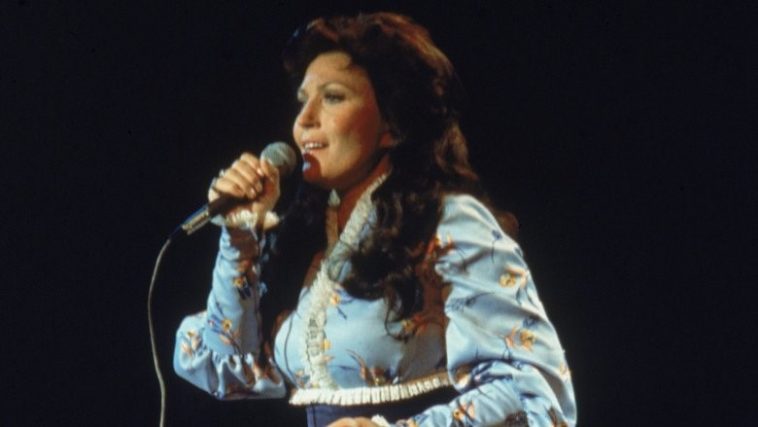Loretta Lynn Was Extremely Poor And Proud Of It
The daughter of a coal miner in Butcher Holler, Kentucky, Loretta Lynn, isn’t afraid to talk about her upbringing in poverty.
The second of Ted and Clara Webb’s eight children, Loretta frequently wore bare feet when attending church and school and wore used flour sacks. It was common to go to bed hungry. It was just a way of life to live without.
Almost everyone in Lynn’s neighborhood needed clothing, food, and a secure place to live during her early childhood years because of the Great Depression.
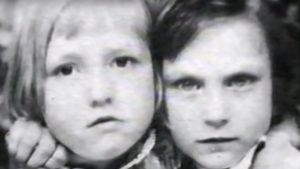
Photo Credits – Youtube
The Webb family resided in a one-room house with no indoor plumbing, electricity, or running water. With magazine pages she tore, Clara Webb painted the home’s walls.
That’s how Clara came up with the name Loretta: She believed actress Loretta Young, well-known for the movie The Farmer’s Daughter, was particularly lovely and hung a photo of her above her daughter’s crib.
There wasn’t much to do at Butcher Holler besides visiting with the nearby family, keeping the house running smoothly, looking after the infants, and attending church.
What the Lynn family’s way of life lacked in adventure and material fortune, it more than made up for love. Loretta Lynn asserts in her best-selling autobiography Coal Miner’s Daughter that being impoverished made her strong and self-sufficient and capable of battling life’s many battles on her own.
The Little Girl Of Daddy Was Loretta Lynn
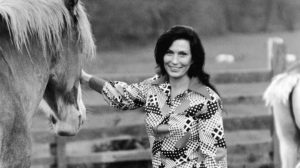
Ted Webb, the kind coal miner who raised Loretta Lynn, was loved growing up. Loretta’s sister Crystal Gale, a legend in the world of country music, is one of Webb’s children.
He loved them all without condition. Loretta’s faith in his love and affection saw her through many trying times. In her book Coal Miner’s Daughter, she claims: “I consider my father to be the most important person in my life.
Daddy is the main reason I always had respect for myself when circumstances became bad between me and Doolittle. I had almost fourteen years of Daddy giving me love and security, the way a daddy should. I was constantly aware of my father’s love.”
When he married Loretta against her father’s objections, Oliver “Mooney” and “Doolittle” Lynn made two promises to Ted. First of all, he vowed never to hurt her physically. Second, he promised not to separate her from her family. He promptly broke both of his vows. He beat Loretta for calling him a whore in jest on their wedding night, and he subsequently dragged her to Washington State to work in the logging camps.
Ted Webb passed away at age 51 after a stroke when Loretta Lynn was in Washington. It was virtually impossible to handle the loss. Loretta was overcome by grief and remorse. However, she overcame that loss because of her Christian faith, which would also aid her through numerous other losses in the years to come.
Loretta Lynn Learned The Hard Way As A Child Bride
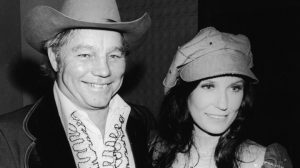
Oliver “Mooney” Lynn and Loretta Webb first met at a pie sale in Butcher Holler.
The auction’s goal was to raise money for the neighborhood school, but it also served as a matchmaking event. Mooney, who had just returned from the Army and had fallen in love with Loretta’s young, brunette beauty, bid on her pie and accompanied her home.
Mooney was a charming man with a flair for romance and was also known for being a heavy drinker and a womanizer. Loretta fell head over herself in love with him.
After four months, and against the desires of her devoted parents, Loretta agreed to wed Mooney.
She was just fifteen, and Mooney was twenty-one. Loretta Lynn claimed in her book Coal Miner’s Daughter that she was only 13 years old when Mooney carried her over the threshold.
However, the Associated Press obtained Lynn’s birth certificate and updated the information in 2012. She was too young to comprehend the pain, financial difficulties, and six children ahead of her.
After the young couple had relocated to Washington, the first of those children, Betty Sue, was born in 1948. When Loretta Lynn became pregnant, Mooney left her for another woman but returned to his wife soon before the baby was born. What a waste of romance.
Hooray For Contraception, Three

By Loretta Lynn was in her mid-twenties, she already had four children.
Later, she would experience two additional pregnancies (in addition to three miscarriages) and pen a popular song about the birth control pill that features lyrics like “This old pregnant dress I’ve got is goin’ in the garbage/The clothes I’m wearin’ from now on won’t take up so much yardage.”
The song “The Pill,” an instant feminist anthem, was censored by numerous radio stations and called sacrilegious by several Christian leaders. Despite these efforts, however, the song gained popularity.
In interviews, Lynn said that she would have adored having had access to the pill as a young lady.
She claimed that she would have eaten the tablets like popcorn. Yet, in her biography Coal Miner’s Daughter, she asserts that she was entirely uninformed of reproductive issues as a child. “Until it happened to me, I never knew where babies came from,” she wrote.
She found being a teen mom challenging and draining. She also had little assistance from her husband, who hired a nanny to take care of the household duties when Lynn was on tour.
A Man Married To The Bottle Was The One Loretta Lynn Was Wed To
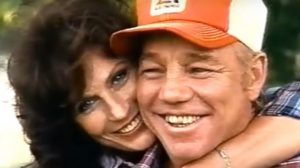
Oliver, Lynn’s spouse, frequently caused her pain. Oliver’s nicknames were “Mooney” (for his preferred beverage, moonshine) and “Doo” (as in “Doolittle,” a moniker whose roots were unknown).
He abandoned her while she was carrying their first kid. When she gave birth to Jack Benny, their son, he went missing in action. He even had a relationship with her brother’s wife.
One of the saddest tales in country music is that Lynn’s first #1 song, “Don’t Come Home A-Drinkin’ (With Lovin’ on Your Mind),” was written in 1967 and was a clear reference to Mooney’s unfaithful ways.
Mooney disappeared two weeks early in Loretta Lynn’s life as a mother. She and her kids survived on dandelions and game she shot in her backyard, according to the CMT program Inside Fame: Loretta Lynn.
Lynn remained faithful to her husband until the end (he passed away from heart failure in 1996). She gave him credit for setting the groundwork for her profession despite the many difficulties they had together and Mooney’s numerous shortcomings.
After all, Mooney persuaded her of her singing and songwriting abilities. He purchased her first guitar, a $17 acoustic Harmony from Sears. She wrote “Honky Tonk Woman” on that guitar, a tune that propelled her out of obscurity and hardship and onto the Grand Ole Opry stage in 1960.

